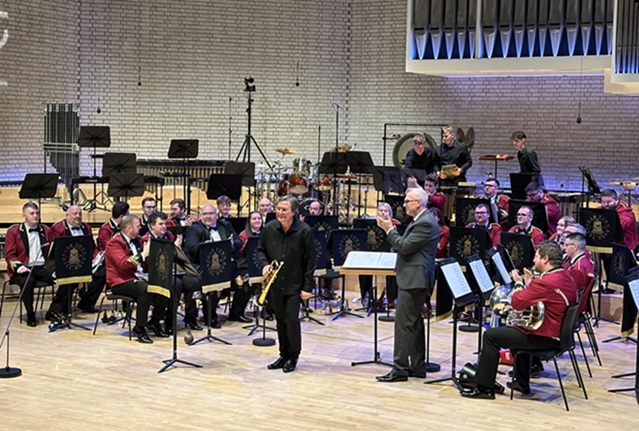

Conductor: Ian Porthouse
Soloist: Matthias Hofs
RNCM International Brass Band Festival
Saturday 27th January
Voices borne of illuminating purity as well as darkest angst permeated the air as German trumpeter Matthias Hofs and Welsh champion Tredegar offered fascinating musical counterbalances to each other’s heavyweight reputations.
Hofs is a performer whose abundant technical gifts serve only to create beauty; the results of which for the past 40 years and more have been moulded with an expressive clarity of style never at odds with itself or the music.
Unimpeachable class
His trio of solos, subtly accompanied, were an endorsement of his unimpeachable class: Wolf Kerschek’s ‘Balkan Children’s Dance’ was tailored with delicate innocence – fleet of foot and inquisitively playful as the rhythmic meter constantly changed direction like a toddler chasing a cat.
He made it sound ridiculously easy, yet it was anything but – as the principal trumpet players of the London Symphony Orchestra, Halle and BBC Philharmonic, spotted taking an afternoon off work to listen to him perform, knew full well.
Wolf Kerschek’s ‘Balkan Children’s Dance’ was tailored with delicate innocence – fleet of foot and inquisitively playful as the rhythmic meter constantly changed direction like a toddler chasing a cat.
So too ‘Spanish Moods’ – the double bell Bb trumpet (the upper muted) seemingly a gimmick, yet unlike an echo cornet, only able to be successfully engaged by total command of articulated alignment. It was an Iberian flavoured display of understated mastery.
His encore was a sublime rendition of Michel Legrand’s ‘How do we Keep the Music Playing’ – his rotary-valved flugel tone pearlescent in its warm lustre, the casual jazz inflections played with graceful nuance.
Wide eyed eagerness
There was a more adolescent sense of ensemble adventure to Jude Radley’s ‘Momentum’ that opened the concert – rhythmic elements of funk, jazz and rock driven ever onwards with wide eyed eagerness and excitement. It was an engaging work from an emerging compositional talent of note.
Oliver Waespi’s explorations of both urban and natural landscapes have long been admired - ‘As if a voice were in them…’ a creative reflection of the beauty of the high Alps and Simplon Pass that inspired William Wordsworth’s poetic genius.
It is nature as an all-powerful and nameless force; man’s incursions scratches to it majestic surface.
It is nature as an all-powerful and nameless force; man’s incursions scratches to it majestic surface. Ian Porthouse drew a compelling interpretation of the score, rich, detailed and ultimately majestic as the antiphonal fanfares drew the piece to its imposing climax.
Virtuous versus venal
Creative reflections of an entirely different, nameless force to close though, with Ludovic Neurohr’s delve into the subconscious psychology of morality – the virtuous versus the venal in ‘Are We Dark Inside?’.
It is a deliberately questioning, schizophrenically virtuosic work, played as such to highlight both serenity and disorder, and which on this occasion its darkest impulses certainly engulfed the listener.
Iwan Fox









